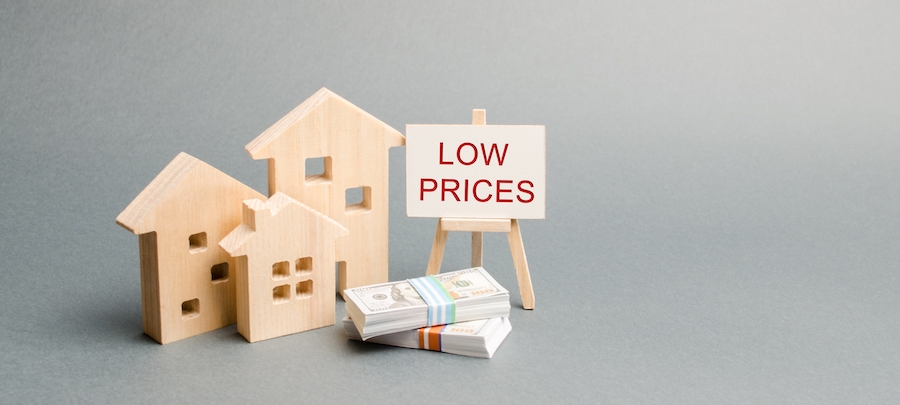Canadians Want To Age In Their Homes
So, They're Turning To Reverse Mortgages
Nine out of ten Canadians want to continue living in their home during their retirement years. Reverse mortgages are helping them achieve that.
A recent survey by a reverse mortgage provider, the HomeEquityBank, found that 95% of Canadians aged 45 or more said living in their homes would help them maintain their independence, comfort and dignity as they age.
This is pretty much unchanged from 2020 when a similar survey was conducted by the National Institute of Ageing. The survey found that more than nine out of ten Canadians plan to support themselves for as long as possible.
In the meantime, reverse mortgage debt held by seniors reached a new record of $5.4 billion as of February. That's an increase of over 18%, or $829 million, over the year before, according to data provided by the Office of the Superintendent of Financial Institutions (OSFI).
The Benefits of Reverse Mortgages
Once a homeowner turns 55, it's generally easier to qualify for a reverse mortgage.
Reverse mortgages allow seniors to supplement their retirement income by tapping into the equity in their homes. They can do that either by way of tax-free lump-sum or monthly payments.
These mortgages are designed in a way that doesn't let seniors owe more than what their house is worth. That's because the debt is paid off once the house is either sold, or the homeowner passed away.
Even though reverse mortgages do not require monthly payments, their typically higher interest rates, which currently range between 5% and 7%, can quickly eat away at the proceeds from the sale of the home. The rising prices over the past couple of years, however, have brought substantial improvements to homeowners' equity.
Due to this growing need for cash, Canada's two leading reverse mortgage providers have experienced record growth over the past year.
Rate Hikes To Lead To House Price Fall?
Capital Economics Says We Could Go Back To Pre-Pandemic Levels
An increase in borrowing rates could reduce Canadian housing prices by 10 percent over the next year, according to Capital Economics. That would lead to an even bigger drop in real estate investment.
“When interest rates rise, home sales are usually the first domino to fall and this time is no different. With sales plunging, it is no longer a question of whether house prices will fall, but rather how much will they fall by?” - said Stephen Brown, senior Canada economist at Capital Economics.
According to the latest housing data for April, significant sales declines are underway as higher interest rates discourage some buyers in many major markets across Canada, such as Toronto, Vancouver and Montreal.
In recent months, fixed mortgage rates have surged ahead of higher interest rates, while variable rates - which now account for over half of new mortgages, according to Bank of Montreal data - have also risen with the Bank of Canada's benchmark rate.
Home Prices 25 Percent Lower Than In 2019?
Brown also said he's assuming that home sales will be cut to 25% below the pre-pandemic average from 2019 and added:
“Because house prices have risen so far beyond a level that can be justified by underlying fundamentals, we suspect that, even in the absence of forced selling, prices will fall by 10 percent during this tightening cycle".
According to Brown, if the prices decline by 10 percent Brown, the biggest impact would be the pullback in housing investment. Even though that would cause a slowdown in economic growth, he does not expect it to result in a contraction of GDP.
“But if house prices fell by much more than we expect – which clearly should not be ruled out given their elevated level – a recession would be almost inevitable."
If you ask Brown, the Bank of Canada doesn't really understand how sensitive real estate investors are to interest rates. It is expected, however, for the Bank to stop its tightening cycle once the rate reaches 2.5 percent.
Three Tips For Homeowners Struggling With Paying Off The Mortgage
Dealing With High Interest Rates And Monthly Payments
With interest rates going higher and the real estate market being the most chaotic ever, it might be hard to deal with high interest rates, bigger monthly mortgage amounts, and the inability to downsize because of the home prices.
Very rarely will we hear about the struggles homeowners and mortgage holders go through, the narrative usually leans toward first home buyers and how it's almost impossible to find a decent home for a fair price.
But, what about you? You worked hard and bought your house. Now, with interest rates being higher and inflation on the rise, it's hard to keep up. And you're not alone.
According to the MNP Consumer Debt Index created by Ipsos, 42% of people surveyed said that the rising rates could drive them closer to bankruptcy.
After the Bank of Canada doubled its rate in March, all the big banks and main mortgage lenders have moved their prime rate to 2.70%. This only made things harder for both mortgage holders and home buyers.
The good news is that most homeowners qualified at the stress test rate of 5.25% and many have had their property values increase by a min of 25% so now may be a great time to tap into that equity that can easily be available. It is still cash and it's your cash.
So, how to deal with that and make your wallet smile for a bit? Take a look at these tips:
Extend Your Amortization
And save up more than 30% on monthly payments. Sure, you might have to pay a higher mortgage rate than what you have now, but extending your mortgage period from 15 to 30 years can be of great benefit for you. By lowering your monthly payments, you will have more money to spend on other important things, like bills or insurance.
Rent A Part Of Your Home
If you can, consider renting a part of your home. That way you can generate more cash flow and lower your debt. Check if your municipal rules allow doing that, and of course, do some background checks on the renter.
Add A HELOC
Currently, secured credit lines are available at prime plus .50% percent and it is interest-only to borrow - but you'll need excellent credit, proof of income and enough equity to qualify, while the minimum equity is 20%.
Read More About HELOC Here
You can also refinance to pay out debt and create a large cash account. In many cases your cash flow increases and payments lower. This also puts the money sitting around in your home doing nothing to work instead of creating more debt.
Ontario Housing Getting Too Expensive
Homebuyers Looking At Calgary Real Estate
As Ontario's housing market is getting too hot to handle, potential homebuyers are shifting their focus toward the western provinces, hoping they find something more affordable. And they are.
Residents of the GTA and other hot markets in Ontario are moving to Alberta, specifically Calgary, where the housing market is a bit more bearable, Bloomberg reports.
According to their article, realtors from the province report an unusually high number of inquiries from Ontario. Statistics Canada is here to back that up with their interprovincial migration numbers. For the first time in more than five years, Alberta led the country in interprovincial migration in the last quarter of 2021.
The benchmark price for detached houses in Calgary rose 20% in the last year and was $620,500. In comparison, Toronto's average selling price at the same time was $1.3 million. In Metro Vancouver for the same month was $1.4 million.
Despite the government's efforts in trying to cool down the housing market, the salaries offered in Toronto and Vancouver are not high enough to cover the cost of living, which is why immigrants are starting to look at other options.
Also, Canada's housing affordability crisis occurred simultaneously with Alberta's years-long recession due to depressed oil prices, which could be another reason east Canada is going west. According to the Conference Board of Canada, Alberta is supposed to lead the country's economic growth this year, as well as the next.
Why Is Calgary Appealing?
Not only did Calgary experience growth in its tech scene, but its nature and proximity to the Rockies also seem appealing to homebuyers. The quality of life seems more inviting, and by selling their homes in the Ontario market, retirees can snatch expensive homes surrounded by nature. According to a recent survey from Royal LePage Realty, recreational properties in Alberta are now the most expensive in Canada, outstripping even B.C. Single-family home prices in Canmore, a popular mountain hamlet 80 kilometres west of Calgary, have risen 33% year over year to $1.36 million.
But, since they aren't putting a mortgage on the property, the higher interest rates don't seem to bother the retirees and there's virtually nothing stopping them from taking their money and moving west.
If the pandemic has taught us something, it's the importance of a backyard and walks, not being trapped in an apartment.
Canada Presents 2022 Federal Budget
Here's all The Tax Talk: First Home Buyers Take The Win, Foreign Buyers Banned
The 2022 federal budget was unveiled in Ottawa a few days ago, with the Liberals focusing on putting billions of dollars towards housing, national defence, climate change, and dental care, as well as reconciliation with Indigenous communities.
There is no mention of any large-scale tax changes in this budget, and notably, there has been no mention of capital gains inclusion rates. However, there is a lot of talk about taxes when it comes to buying property, employment and small businesses.
Budget 2022 proposes:
- A Tax-Free First Home Savings Account, which would allow prospective first-time homebuyers to save up to $40, 000. Contributions would be tax-deductible, and withdrawals to purchase a first home would be non-taxable. In 2023, the government intends to work with financial institutions to ensure that a TaxFree First Home Savings Account can be opened. Approximately $725 million in support would be provided by the Tax-Free First Home Savings Account over a five-year period.
- Doubling the First-Time Home Buyers’ Tax Credit amount to $10,000, which would provide up to $1,500 in direct support to home buyers. However, this measure would only apply to homes bought on or after January 1st, 2022.
- Banning foreign investment in Canadian housing. That means that foreign people, as in people who are not citizens or permanent residents of Canada, won't be able to buy property for at least two years.
- Property Flipping To Come With A Cost - this is another way of Canada's effort to save the housing market. Property flipping means selling a property you have held for less than a year. According to the new plan, anyone who does that will be subject to full taxation on their profits.
- Taxing all assignment sales of newly constructed or substantially renovated residential properties fo GST/HST purposes. Effective May 7, 2022.
- Tax reduction for small businesses growing in Canada: phase out access to small business tax rates more gradually, with access to be fully phased out at $50 million, rather than $15 million.
- Employee ownership trusts: Employee ownership trusts are designed to encourage employees to become the owners of their companies, decreasing the amount of privately-owned companies.
- To close the double-deduction loophole by amending the Income Tax Axt to deny a taxpayer the deduction of dividends received when such transactions have taken place.
- Increasing the maximum amount of forgivable Canada Student Loans for doctors and nurses in rural and remote communities, by 50 percent. Up to $30,000 in loan forgiveness for nurses, and up to double the amount for doctors.
- Dental Care for Canadians covered by Health Canada. By 2025, this will be fully implemented for all children under the age of 12, seniors, and persons living with a disability. It will start with under-12-year-olds in 2022, then expand to those under 18 years old and persons living with a disability in 2023. This will be restricted to families with less than $90,000 annually.
- Asking Financial Institutions to Help pay for the recovery - by imposing a temporary Canada Recovery Dividend of 15% on taxable income above a billion dollars for the 2021 tax year. It also proposes to raise the corporate income tax by 1.5% on the taxable income of banking and life insurance groups.
- Preventing Using Foreign Corporations to Avoid Tax - investment income earned and distributed by private corporations is prone to the same taxation as investment income earned and distributed by CCPCs. That means this bill could apply to those who have moved their corporation into a foreign country to pay lower taxes by using foreign shell companies or by moving to an offshore corporation.
- Boosting Charity - a new disbursement quota rates for charities. For investments above a million dollars, the quota will be from 3.5 to 5 percent.
- Minimum Tax For High Earners - the budget proposes the next steps towards the government's examination of a new minimum tax regimen which should go towards ensuring that all wealthier Canadians pay their fair share of tax.
- Correcting Anti-Avoidance Tax Rules that should ensure the correct amount of tax is paid when an interest coupon stripping arrangement is used since they exploit the differences between international tax treaties and allow some to pay less in taxes.
- International Tax Reform - the government is ready to introduce legislation for a digital services tax to ensure that all corporations, including those in the digital sector, pay their fair share of tax on the revenue they earn in Canada.
- Cryptocurrencies in Canada - the government is addressing the digitalization of financial assets while announcing the launching of a financial sector legislative review that will focus on cryptocurrencies and stablecoins.
- Strengthening GAAR (general anti-avoidance rule) - by mending the income tax to provide that the GAAR will apply to transactions affecting tax attributes that have not yet been used to reduce the taxes.
- Bill C-208 Follow-up - setting up a consultation process to hear stakeholder views on how to continue to facilitate genuine intergenerational business transfers while protecting the integrity of tax systems.
- Discontinuing flow-through shares for oil, gas, and coal activities
Switching to zero-emission vehicles - widening the range of eligible vehicles for purchase incentives. - Construction tradespeople and apprentices who temporarily relocate for work will be able to deduct up to $4000 per year for reasonable lodging expenses.
- Blind Bidding: A Home Buyers' Bill of Rights and a national plan to end blind bidding will be developed and implemented over the next year by the Minister of Housing and Diversity and Inclusion. Besides ensuring a legal right to a home inspection, a Home Buyers Bill of Rights could also ensure transparency on the history of price changes on title searches.
- Housing Accelerator Fund: The Budget proposes to provide $4 billion to the Canada Mortgage and Housing Corporation to launch a new Housing Accelerator Fund. The fund will be dedicated to assisting municipalities in building 100,000 new units over the next five years.
Also, according to the federal budget, people wanting to renovate their homes and add accommodation for a senior person can also get a tax credit. It will be called Multigenerational Home Renovation Tax Credit, and it would provide up to $7500 in support for the construction of a suite for a senior or an adult with a disability. This will allow families to claim up to $50 000 if the expenses are eligible, starting in 2023.
As for other types of renovations, you can get up to $10 000 of a tax credit on eligible home renovation expenses through the non-refundable HATC.
First Time Home Buyer Incentive
In order to help more people buy their first home, the federal government introduced the First-Time Home Buyer Incentive, which allows eligible first-time homebuyers to lower their borrowing costs by sharing the cost of buying a home with the government. The government extended the incentive to March 31, 2025. Canada is also researching an option that would let you rent until you own. To help develop that plan, Canada is providing $200 million under the existing Affordable Housing Innovation Fund.
If you need help buying your first home, give us a call.
Home Prices Decline Likely?
Some Say A decline of 24% is possible!
According to a growing number of economic forecasts, Canadian house prices could decline in the near term, with some suggesting declines of as much as 25%.
One such report came from Capital Economics, which described how rising rates pose a major threat to the housing market. However, the housing market won't return to a pre-pandemic mortgage rate.
In the event that the overnight lending rate, which influences the prime rate and, in turn, variable mortgage rates, reaches 2%, house price increases should slow to "little more than zero" next year, said Capital Economics economist Stephen Brown. A higher policy rate would trigger a decline in house prices.
“We shouldn’t assume that the Bank wants to avoid house price declines at any cost. “House prices are a key driver of shelter inflation, so moderate declines would help to get consumer price inflation under control without seriously jeopardizing the economy.”
Although prices are high compared to traditional valuation metrics, Brown said an initial decline could lead to lower house prices and lower expectations.
On the other hand, Oxford Economics sees home prices falling 24% by mid-2024. According to the report by Tony Spillo, the median home price was 19% above the borrowing capacity of the median-income household by late 2021, and it is expected to reach 38% above that by mid-year.
“We believe this will cause the housing market to reach a breaking point and crash under the weight of its own success before year-end,” - he wrote.
Higher borrowing rates are another factor, with the Bank of Canada's policy rate expected to reach at least 2% by 2024. Also, by the middle of this year, Oxford expects average 5-year fixed rates to reach 4.25% and by the end of this decade, 5%.
According to Oxford, the third factor that could help bring house prices to the lower side is the introduction of government policies, such as house-flipping tax, tax on non-resident-owned vacant homes, and a temporary ban on foreign ownership.
Still, even though the house prices could decline by 24%, that would still be 15% higher than before the pandemic.
However, not everyone thinks the decline is about to happen. RBC economics said prices are actually likely to grow by 6.2 percent. The Canadian Real Estate Association also released an updated housing market forecast earlier this month. They predict an annual average sale price of $786,000, an increase of nearly $47,000 over its December forecast, which represents an increase of 14.3% over prices in 2021. Prices are expected to grow at an annual rate of 3.2% in 2023, according to the report.
Interest Rates Are Rising In Canada
Fixed-Rate Mortgage Sounds Like A Good Idea Now?
For the first time in years, the Bank of Canada raised its benchmark rate from 0.25 to 0.5 percent. Why? To keep inflation under control and cool off the real estate market.
However, the rates are not yet as big as they were before the pandemic. In January of 2020, the rates were at 1.75 percent and were slashed down to 0.25. The rates may go back to what they were before - investors think there could be five more small rate hikes by the end of the year, due to inflation and the Russo-Ukrainian conflict.
The Bank of Canada's rate has a massive role and affects the consumers in a significant way - mortgages, lines of credit and savings accounts might not look the same for some people. For example, this event might push some mortgage holders towards fixed-rate mortgages.
Let's say more increases happen - a mortgage that costs you $1,500 a month now, could cost you more than $1,800 by the end of 2022, due to the rates rising. Does this mean you should switch to a fixed-rate mortgage? Depends.
Even though the rates have gone up, they are still historically low - there is no guarantee they will stay that way. But, variable rates never had any guarantees in the first place.
Also, fixed rates are past their lowest, while the variable ones have just started rising. However, if you are struggling with staying calm each time the Bank of Canada releases a statement and are afraid you won't be able to afford your mortgage anymore - if you can do so, switch to a fixed one. Each person's finances are different, so it's hard to come up with a one-size-fits-all solution. If you're not sure what to do at this time, don't hesitate to give us a call and ask for advice.
There is no doubt that this increase will affect a lot of households that might end up paying hundreds of dollars more for their mortgages. There will have to be a lot of readjusting of budgets, especially for those with other costs of borrowing, like HELOC or other variable rate loans.
Hybrid Mortgages In Canada
The house buying market is hot and heavy and for some people, it might even seem that their own house is way out of reach. That's why it's crucial to know all of the options out there when talking about mortgages and financial obligations. The most important thing when buying your home is planning. How will it affect your monthly finances, how will it change your lifestyle and how will you pay everything off? Those are the questions you must find an answer to before calling the realtor.
When it comes to rates and monthly payments, it's easy to get confused and overwhelmed, especially in the situations we are facing today, with inflation and pandemic recovery.
So, committing to a specific rate doesn't sound appealing to some. And to them, we say - hybrid mortgage. You can benefit from both rising and falling interest rates with hybrid mortgages, as they offer some protection from rising interest rates.
What is a Hybrid Mortgage And How Does It Work In Canada?
A type of mortgage that combines parts of fixed-rate and variable-rate mortgages. You split the mortgage into two parts and each will have a different type of rate. The thing is, the two portions of the mortgage can have independent terms, which might lead to difficulties in switching lenders. For example, if you choose to have a variable rate for two years, but a fixed rate for three. Also, you can choose to have different rates based on the mortgage amount and go halfsies for each part.
With hybrid mortgages, you have multiple components on an approved loan: different rates, different term lengths. But, if you choose to have different term lengths and decide to end the contract at some point earlier than you thought, you will probably be in the middle of the other term which can lead to penalties - since to get out of that one, you have to break the contract. If you manage to match all the terms with the same date, you can avoid the penalties and get out of a hybrid mortgage worry-free.
Pros Of Hybrid Mortgage In Canada
The main benefit of this type of mortgage is having both fixed and variable rates at the same time. That way you stay protected if, for example, variable rates go up a lot. While your variable part might suffer the consequences of higher rates, your fixed part of the mortgage is still intact. On the other hand, if the rates go down, you still benefit from having the variable part. Your monthly amount can be lower if changes in rates happen - you don't have that option with fixed-rate mortgages. With the hybrid model, you can be sure the rates will remain low in a certain time frame.
Cons Of Hybrid Mortgage In Canada
Usually, hybrid mortgages end up costing more than a variable rate mortgage, and the lender has more power over you, as we mentioned above. It can be tougher to go through with an early payoff and it's more possible that you won't pick the most cost-effective option.
The Takeaway
In some cases, a hybrid mortgage is the better option, depending on your preferences. If you're a person that wants fixed-rate security and likes having the same monthly amount for payments, but would also like to benefit from possible lower variable rates, then this option is a good idea. Either way, whatever mortgage you might be thinking of getting, it would be wise to consult a broker. They can give you advice on all of your possibilities and find the perfect rates that would work for you based on your preferences and finance. Give us a try, we would love to hear from you!
Home Renovation Things You Need To Know
Can you borrow money to renovate your home and should you? That is one of the top questions that comes to mind when thinking not only of selling your house but buying a fixer-upper too. The good news, yes you can. Should you? Well, that depends. There are a few things to consider before renovating your home: types of financing, return on investment, your home's value and the insurance policy are some of those things. So, let's start, shall we?
Types Of Renovation Financing Options
In Canada, there are a few financing options when it comes to home improvement: unsecured personal loan, credit card, cash-out mortgage refinancing and home equity line of credit.
Unsecured Personal Loan
With a stable income and a good credit score, you can apply for an unsecured personal loan. All you have to do is agree on a loan term and an interest rate, and the funds are transferred to you in full. You then proceed to make regular payments to the lender until you pay everything off. There is no collateral required and the rates are often affordable.
Credit Card
To finance your renovations, you can use the remaining balance on your credit card. This option is not so common due to the high-interest rates on credit cards, often higher than personal loans. You can do this for small payments, incidentals, or renovations that do not require a lot of work. When deciding whether to use a credit card for renovation or not, check if you can repay that balance in a month. Because if you can't, you will most likely face some big interest bills.
Cash-out Mortgage Refinancing
With cash-out mortgage refinancing, you refinance your existing mortgage for a greater amount than what you currently owe. The difference is paid to you in a lump sum and is up to you to decide what you will do with the money. How much money you qualify for depends on how much equity you have in the home. The longer you own the home, the more equity you have and the more loan amount you can get.
The interest for this option is usually low, and it practically pays for itself IF the renovation is big enough to increase your home's value in the end.
Home Equity Line Of Credit (HELOC)
Taking out a home equity line of credit is another common method of financing home improvements. Here, your home equity is used as collateral for the loan. If you want to qualify for it, you need equity in your home of at least 15 percent, though some lenders require at least 20 percent.
How Much Do Home Improvements Affect Your Home's Value?
Some of the most popular renovations in one's home are connected to bathrooms, kitchens and backyards. Oftentimes, people think getting a pool might increase their homes' value, but in most cases, buyers don't really care about pools, especially in today's market. So, even though having a pool should increase your home's value, it might be harder to sell it. Some resources say that a pool can increase your home's value by less than 2.5 percent, while others will say the increase will be a maximum of 7 percent of your pool cost.
For comparison, a new bathroom might add between 2.5 and 12.5 % in value, while kitchens add up to more than 12.5%. It all depends on the current trends, materials used, style and more. However, there are small renovations that go a long way - a fresh coat of paint comes with the highest return on investment.
What Happens To Your Insurance If You Go Through With This?
While renovating your home might sound appealing, think twice and check the fine print on your insurance contract. In some cases, housing upgrades can affect your insurance policy, depending on the type of renovation you're thinking of having. If you're adding a bedroom or a little studio apartment above your garage, you will need to call your insurance company and talk to them about your new home-worth. More square feet, more money to pay for insurance. With swimming pools, there is an extra 'issue' since with them, come hazardous possibilities like drowning. Some insurance companies might not want to insure your home until you put a fence around the pool, some won't insure it at all. That's why it's important to do your research before applying for a loan.
Renovating a home comes with a lot of dedication and satisfaction, but responsibilities too. Choosing a suitable loan for financing can be hard, which is why you should talk to a professional before taking the leap. Contact us today for some advice!
The Inflation Tsunami in Canada
Things become more expensive than before because of inflation, an important concept for all economies.
Inflation measures how much the prices of goods and services are rising. Many factors are responsible for changing prices. These include the cost of making a product (including raw materials and labour), availability of the product, competition among sellers, and so forth.
Besides, central banks often put economic policies to stimulate economic growth. These policies may also cause inflation. The reason is that when people have a bit more money, their demand for products and services also rises.
They have the means to desire more goods, and when more people in an economy have both the desire and means to go after such goods. These actions cause prices to go up because there’s competition for the few goods available – another economic concept called scarcity.
The Problems that Inflation Causes
Like other countries, the Canadian economy performs best when inflation is stable and predictable. Company budgets often make assumptions about how much the price of supplies, rent, salaries, and other overhead will go up. When these costs rise, companies raise their prices too.
High inflation means prices are climbing quickly (they are “inflated”), and fewer people have as many dollars to afford those goods or services anymore. It means that inflation limits the purchasing power of people. But, higher prices also mean that people buy less, and the economy slows down.
People who have also saved up for retirement will suddenly realize that their money is less than they need to buy as many things or the quality of goods and services they need. Businesses and consumers need to spend time and effort to ensure that rising costs do not affect them too much.
How bad is high inflation?
Sometimes, inflation is so high that the economy is out of control. The economies of Venezuela and Zimbabwe have known economic troubles due to high inflation for several years. According to the International Monetary Fund, in the former case, it was more than 2,800 percent in 2017. It means that a $5 meal one day would cost $445 one year from now. Economists call this scenario hyperinflation.
How about low inflation?
Just because high inflation is terrible doesn't necessarily mean that low inflation is better. Of course, prices are falling, causing demand to go up for those goods affected. When prices continue in a free fall, it shows there are deeper problems within an economy.
People spend less when they have no jobs. Firms will then lower prices in order to boost sales. But, people may prefer to wait a bit, believing prices will keep falling. They create a cycle of saving more money, spending less, prices falling further, and economic activity shrinking.
Using Interest Rates to Control Inflation in Canada
Canadian businesses have enjoyed low inflation since 1991 when the Bank of Canada and the Government of Canada agreed to ensure companies and people can have low, stable, and predictable inflation. Inflation has been close to 2 percent since that agreement.
The BoC’s key to keeping inflation low, stable, and predictable is raising or lowering its key policy interest rate. Therefore, banks increase rates on deposits, loans, and mortgages.
Higher rates encourage saving and make people borrow and spend less. Companies can then slowly increase their prices or lower them to improve demand; this reduces inflation.
On the other hand, lower interest rates can help boost inflation when lower than expected.
All this shows that the economy needs a bit of inflation to be in good shape. It's similar to adding salt or another seasoning to your food. Too much means you can't eat the food, and too little means the food may taste bland. Therefore, using interest rates to control inflation works, but it's a tricky balancing act.
The Coming Canada Interest Rate Hike
Despite keeping them to 25 percent for nearly three decades, economists expect Canada’s top bank to raise interest rates by the end of the third quarter of 2022. Many are even predicting the first hike as early as the end of June.
Brendan LaCerda, a senior economist at Moody's Analytics, believes the Bank of Canada "will raise rates…the elevated rate of inflation is putting pressure on the Bank of Canada and the Fed..." But, he also points out the reluctance to raise interest rates and risk stunting the recovery.
The curious case of Canada's annual inflation hitting an 18-year high has made headlines. In print and electronic media. The middle class knows it would bear much of the brunt, so search phrases like "Canada Interest Rate Hike" and "Inflation Spike in Canada" are now common.
Despite COVID, Canada has maintained a strong economy, but inflation looks set to shatter the 5 percent ceiling, according to ING’s James Knightly.
The Middle Class Always Pays the Price
Inflation, rising prices, and interest rate hikes affect the entire economy. Yet, the middle class seems to suffer much of the consequences.
The catalyst for the rise in the annual inflation rate is partly higher prices for electricity, insurance, and passenger vehicles – general consumer goods.
Even though there’s the possibility of earning more income in this era, the new wave of inflation could make your extra earnings seem like a drop in the ocean.
If the BoC hikes interest rates, it will affect short-term borrowing. Higher interest rates will increase the borrowing rates for consumers, but low rates mean you can reduce the loan principal faster instead of using more of that money to cover the bank's interest.
Conclusion
The coming months will be testy for consumers and the government. Central bank officials will be paying attention to inflation and every movement in price. However, they won’t bother much about prices that are never really stable. They’ll also not pay attention to one-off price changes.
If price changes affect more consumers and linger, they’re likely to push inflation further from the target for a long while. The Bank will do something about such changes so that policy interest rate changes will quickly affect people’s spending, keeping the business climate bustling.










